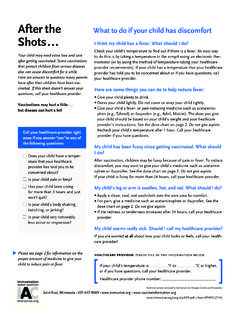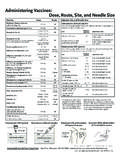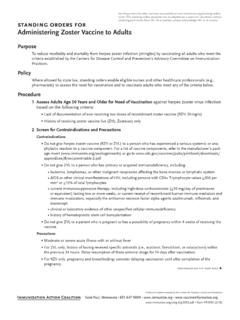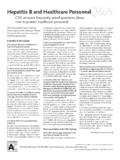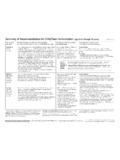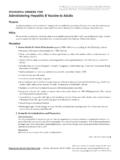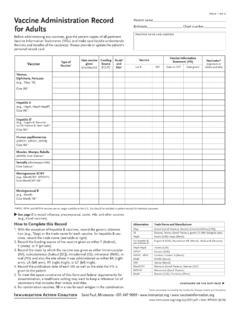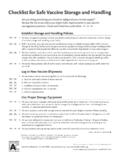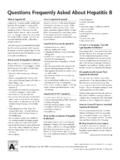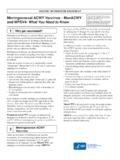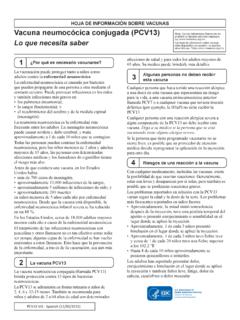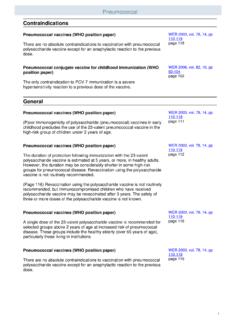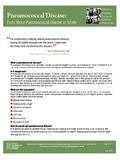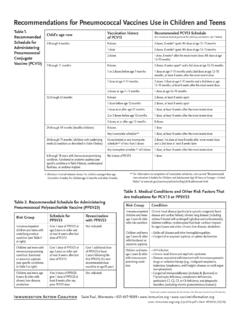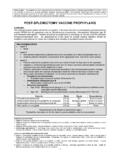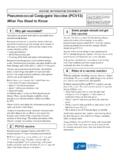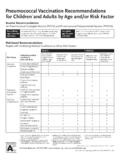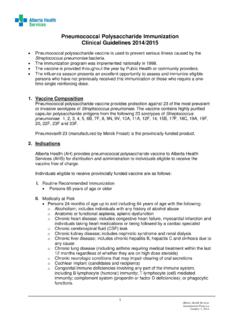Transcription of Pneumococcal Vaccines -- CDC answers your questions
1 Experts from the National Center for Immunization and Respiratory Diseases at the Centers for Disease Control and Prevention answer your questions about Pneumococcal polysaccharide (PPSV23) and Pneumococcal conjugate (PCV13) serious is Pneumococcal disease? Pneumococcal disease is a serious disease that causes much sickness and estimated 36,850 cases and 4,250 deaths from invasive Pneumococcal diseases (IPD- bacteremia and meningitis) occurred in the United States in 2011. In 2013 an estimated 13,500 cases of IPD occurred among adults age 65 years and older. Children younger than age 5 and adults older than 65 have the highest incidence of serious rates are highest for pneumo-coccal meningitis and bacteremia, and the highest mortality occurs among the elderly and patients who have underlying medical condi-tions. Despite appropriate antimicrobial ther-apy and intensive medical care, the overall case-fatality rate for Pneumococcal bacteremia is about 20% among adults.
2 Among elderly patients, the rate may be as high as 60%.Who is recommended to receive pneumo-coccal polysaccharide vaccine (PPSV23)?PPSV23 (Pneumovax, Merck) is recommended for anyone who meets any of the criteria below: Age 65 years and older Age 2 through 64 years with any of the fol-lowing conditions 1. cigarette smokers age 19 years and older 2. alcoholism 3. chronic liver disease, cirrhosis 4. chronic cardiovascular disease, excluding hypertension ( , congestive heart fail-ure, cardiomyopathies) 5. chronic pulmonary disease (including COPD and emphysema, and for adults age 19 years and older, asthma) 6. diabetes mellitus 7. candidate for or recipient of cochlear implant 8. cerebrospinal fluid (CSF) leak 9. functional or anatomic asplenia ( , sickle cell disease, splenectomy) 10. immunocompromising conditions ( , HIV infection, leukemia, congenital immunodeficiency, Hodgkin s disease, lymphoma, multiple myeloma, generalized malignancy, immunosuppressive therapy) 11.
3 Solid organ transplantation; for bone marrow transplantation, see Vaccines / 12. chronic renal failure or nephrotic syndromeCould you briefly summarize the revaccination recommendations for PPSV23?Children and adults younger than age 65 who are at highest risk for serious Pneumococcal infection or likely to have a rapid decline in antibody levels (see categories 9 through 12 in previous answer) should get 2 doses of PPSV23 5 years apart, with a third dose after they turn age 65 (if at least 5 years have passed since the last dose). Patients with no risk factors should get 1 dose at age 65. Thus, depending on risk and age at vac-cination, a person age 65 or older may have received 1, 2, or 3 doses of are the recommendations for routinely administering PCV13 to children?Give infants a primary series of pneumococ-cal conjugate vaccine (PCV13, Prevnar 13, Pfizer) at age 2, 4, and 6 months.
4 Boost at age 12 through 15 months. For catch-up vaccina-tion, give PCV13 to healthy children through age 59 months and give PCV13 to children through age 71 months who have certain under lying medical conditions. For informa-tion on underlying medical conditions, see next question and underlying medical conditions indicate that an older child or teen should receive PCV13?PCV13 vaccination is recommended for unvac-cinated children age 2 through 71 months (6 years) who are in categories 4 12 in the numbered list to the left and for PCV13-na ve children age 6 through 18 years who are in categories 7 adults are recommended to receive a dose of PCV13 vaccine?All adults age 65 years and older should receive one dose of PCV13. In addition, adults age 19 through 64 years who have not previ-ously received PCV13 and who have the condi-tions specified below should receive a PCV13 dose at the next vaccination opportunity.
5 Immunocompromising conditions ( , congenital or acquired immunodeficiency, HIV, chronic renal failure, nephrotic syn-drome, leukemia, lymphoma, Hodgkin s disease, generalized malignancy, iatrogenic immunosuppression, solid organ trans-plant, and multiple myeloma) Functional or anatomic asplenia ( , sickle cell disease and other hemoglobinopathies and congenital and acquired asplenia) Cerebrospinal fluid (CSF) leak Cochlear implantsWhat dosing intervals should be observed when giving PCV13 and PPSV23 to patients (children and adults) who are recommended to receive both Vaccines ?Give PCV13 before PPSV23 if possible. For children, if the child has already received PPSV23, wait 8 weeks before giving PCV13. For persons age 65 years and older who have not previously received Pneumococcal vac-cine or whose Pneumococcal vaccine history is unknown, give PCV13 followed by PPSV23 12 months later.
6 For adults 19 through 64 years at high risk of Pneumococcal dis-ease give PCV13 followed by PPSV23 at least 8 weeks later. For adults, if the person has already received PPSV23, wait 12 months before giving patients who are in a recommended risk group for PPSV23 or PCV13 aren t sure if they have already received these Vaccines , should healthcare providers vaccinate them?Yes. If patients do not have a documented vaccination history and their records are not readily obtainable, you should administer the recommended doses. Extra doses will not harm the content reviewed by the Centers for Disease Control and PreventionSaint Paul, Minnesota 651-647-9009 Item #P2015 (11/15)continued on the next page For complete information on CDC s recommendations for the use of Pneumococcal Vaccines , go to Pneumococcal Vaccines : CDC answers Your QuestionsWe gave PCV13 then PPSV23 8 weeks later to a 66-year-old patient who is newly diagnosed with a medical condition that places him at increased risk for Pneumococcal disease and its complications.
7 Should we give him a second dose of PPSV23 in 5 years because of his underlying medical condition?No. People who are first vaccinated with PPSV23 at age 65 years or older should receive only 1 dose, regardless of their underlying medical should I vaccinate a child or adult who is planning to have either a cochlear implant or elective splenectomy?If possible, administer the appropriate vac-cine prior to the splenectomy or cochlear implant so that the person planning to have the procedure has antibody to pneumococcus at the time of the surgery. If the procedure is done on an emergency basis, vaccinate as soon as possible according to the routine schedule. Administer a dose of PPSV23 to all patients no sooner than 8 weeks (minimum interval) from the previous dose of a patient has had laboratory-confirmed Pneumococcal pneumonia, does he or she still need to be vaccinated with PCV13 and/or PPSV23?
8 Yes. More than 90 known serotypes of pneu-mococcus exist (23 serotypes are in PPSV23 and 13 serotypes are in PCV13). Infection with one serotype does not necessarily pro-duce immunity to other serotypes. As a result, patients who are candidates for vaccination should be vaccinated even if they have had one or more episodes of invasive Pneumococcal Vaccines : CDC answers Your questions (continued) page 2 of 2 For more Q&As about Pneumococcal Vaccines from experts at CDC s NCIRD, visit more than 1,000 Q&As about Vaccines and their administration at content reviewed by the Centers for Disease Control and PreventionSaint Paul, Minnesota 651-647-9009 Item #P2015 (11/15)
